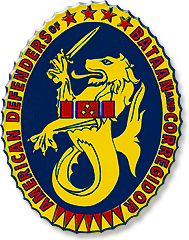
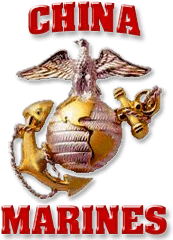
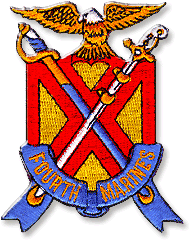
 |
 |
 |
| Fourth Marines Band: "Last China Band" |
|
|
||||||||||||||||||
|
MIKADO NO KYAKU (Guest of the Emperor) |
||||||||||||||||||
| The recollections of United States Marine Corps Corporal Donald LeRoy Versaw as a Japanese prisoner of war during World War II. By: Master Sergeant Donald LeRoy Versaw / United States Marine Corps / Retired | ||||||||||||||||||
|
CONTENTS |
||||||||||||||||||
|
||||||||||||||||||
|
||||||||||||||||||
| DEDICATION | ||||||||||||||||||
| My
grandfather Sergeant Francis E. Versaw, 3rd Michigan Cavalry who fought
in the war to save the nation and abolish slavery. He personally knew
and experienced the terror and deprivations of being a prisoner of war. The thousands of Allied soldiers, sailors and airmen who fought and died that many millions of us would enjoy freedom again. All the Filipino people who put themselves in harms way to help the plight of American prisoners of war in so many ways. The few Japanese soldiers who occasionally showed great compassion to their captives along with the millions of civilians who had to suffer and die needlessly for all the wrong reasons. To my sister Helen, and all the many relatives and friends who for so many years urged this book be published. |
||||||||||||||||||
| ACKNOWLEDGEMENTS | ||||||||||||||||||
| My
wife Amelda for her love and patience of more than fifty years. Our Children, Judith and Denise Our grandchildren Jennifer, Melissa, Heather, Eric and Matthew My parents Don L. and Lucy Mae Versaw who suffered so many months of anxiety while I was missing and their faith and prayers for my survival. My buddies of the 4th Marines Band: George Francis, Lou Curtis, Chum Leber, Franklin Boyer, "CW" Stevens, Norman Shire, Martin Eichman, Leland Montgomery, and Harry Dunlavy still living to help remember the others. Members of my Clique at Clark Field POW camp; William Luther, Lyle Brown, and Thornton Hamby. Members of the Tribe of Francis; American Ex-Prisoners of War; American Defenders of Bataan and Corregidor; and the Disabled American Veterans. Special thanks to Russ Romain who with his great talent and design expertise brought this book to light. To Earl Blount who promoted getting this story into print with no more delay. Also, everlasting gratitude for Ken Smith, Lee Gonzales, for comradeship and support that still continues here even though, sadly, they are gone. And to Jack Sheidecker who has done much for all former prisoners of war. A special thanks also to Kauuku Yamada for his advice and assistance with this work. Edited by Phillip Dreiseszun Consulting by Marine Corps Musicians Association Historian |
||||||||||||||||||
| PREFACE | ||||||||||||||||||
| This
book is the story of having been a prisoner of war of the Japanese
during most of World War II. A great many people - thousands of them -
endured an almost identical trial in their young lives as I did. A
number of us have written books about it and now, in the fading light
of our lives, more are doing so. Most have published their work at
their own expense. This book is a another example. Not unlike many other offerings, this one was originally titled "Guest of the Emperor." It may have been one of the very first manuscripts to bear that title, the first draft having been typed during the winter of 1945. Some years later, a heavily edited version was hand-published on a Multilith by Arlene Brown and Bill Holly, and a number of Acero fastened copies were run off and given a limited distribution. The editor of that edition was Ruth Reynolds, a professional writer of crime stories for the New York Sunday News. Early in 1990, Noel and Norma Roberts, both avid readers, became interested in the Reynolds' edited manuscript. They felt the story really prompted more questions than it answered and left them wanting to know more about my experience and in greater detail. I set about doing this. They gave me great assistance with editing and encouragement. I was not yet 21 years old when the island fortress of Corregidor was surrendered to the Japanese. I spent my 21st, 22nd, 23rd and 24th birthdays in captivity, but the only birthday I was ever allowed to celebrate was that of Emperor Hirohito each 28th of April. The observance was marked by extra long hours at hard labor. If nothing else, this will serve as a historical record for my descendants, family members and friends who may have an interest in knowing what happened to me in the Philippines and in the land of the rising sun so many years ago. I have struggled a long time with a title for my work. It is still "Guest of the Emperor" to me and will remain so, but in Japanese - Mlkado no Kyaku, was a phrase used by Japanese officials in the prison camps, where we were often cruelly reminded that was what we then were, "guests". They were hosts of a kind so cruel as at times to be beyond definition. It is only in recent years that citizens of Japan have learned how their wartime government grossly abused thousands of their captives. This story is an account of a luckier one than many. My saga begins where the experience ended. Enslaved at work in the Kyushu mines, having survived more that two years in confinement in Luzon, Philippine Island prison camps and followlng a terrifying and horrific voyage at sea in a ship of Hell from Manila to Moji, Japan. I was made to work for food in a coal mlne. In Japan they are dark, dank and fearful places. The only thing to help relieve the terror was to focus on the moment and try not to worry about cave-ins, brutal beatings, the pangs of hunger or the hell of tomorrow. This is the condition of the whole matter of being a prisoner of war. You can't wonder if you wlll ever see the light of day again, if you will ever taste the sweet joy of freedom. You must know that you will, simply because there is a merciful God in heaven in whom you trust all things. dlv 1998 |
||||||||||||||||||
|
|
||||||||||||||||||
|
Telegram Received by my Dad from the Marine Corps Recruiting, November 10, 1939 |
||||||||||||||||||
|
CHRONOLOGY |
||||||||||||||||||
| November 27, 1941 - 4th Marines
leave Shanghai December 8, 1941 - Japan attacks NAS Subic Bay / Band becomes Infantry December 24, 1941 - 4th Marines go to Marivales, Bataan December 28, 1941 - 4th Marines go to Corregidor / Middleside Barracks December 29, 1941 - Japanese Bomb Corregidor first time. The 4th Marines assigned to Fortress Beach Defense and the band goes to end of South Shore Road. January 1942 - All forces withdraw to Bataan and battle begins as Japanese attack with entire 14th Army. Siege of Corregidor and Island fortresses continue with daily air attacks. April 9, 1942 - Bataan defenders overwhelmed and surrender. "Death March" begins for most survivors. Many escape to Corregidor. April 9, 1942 - Japanese begin large caliber bombardment of Corregidor and Ft. Hughes with 240mm siege guns and heavier aerial bombing. May 5, 1942 - Japanese land ground forces on Corregidor along with armor. Thinly distributed troops overrun. May 6, 1942 - General Wainright surrenders Corregidor and all harbor defenses in Manila Bay. All troops held hostage at 92nd Garage area until all Philippine Islands surrendered. June 1942 - Most troops, now Prisoners of War, moved to Paranaque Beach near Manila and marched to Bilibid Prison. (March of Shame) June 21, 1942 - Donald goes in large draft by rail to Cabanatuan and marches to Camp #3. Oct/ Nov 1942 - Camp #3 closed as POW camp and all move to Camp #1 nearer to the city. November 1942 - Sent with small detail to work at Clark Air Base to cut grass on air strip. April 1, 1943 - Falligan escapes. Conditions at camp worsen. Put to work digging air craft revetments and digging out aggregate for concrete air strip. April 1944 - Develop complications due to intestinal worms. Sent to Bilibid (hospital) in Manila. June 1944 - Returned to Cabanatuan Camp 1. Detailed to Japan draft via Bilibid. July 17, 1944 - Began Voyage of Hell Ship Nissyo Maru. August 6, 1944 - Arrived Moji, Kyushu Japan. Sent by train to Shin Izuka, Fukuoka Province for work detail in Honko and Shinko mines. Spring 1945 - Got amoebic dysentery and put on light duty. Worked above ground at gardening. Tea farm hand and occasional dairy hand. August 6 & 9, 1945 - Atom bombs fall on Japan. August 24, 1945 - All prisoners returned from their work places. Negotiations for surrender of Japan begin. August 28, 1945 - U.S. Aircraft supply our camp with food and clothing. September 2, 1945 - Japan surrenders on USS Missouri. September 21, 1945 - Our camp is abandoned and troops leave by train for Nagasaki. September 22, 1945 - Sail on USS Coffer DE to Okinawa. September 24, 1945 - Flown to Guam on Army Air Corps C-47. September 28, 1945 - Storms ground planes. Sailed on Army Transport ship for San Francisco. October 6, 1945 - Arrive San Francisco and admitted to USN Hospital, Oak Knoll for evaluation. October 10, 1945 - Elected to transfer to USN Hospital Great Lakes, IL October 15, 1945 Granted 90 day Leave of Absence. First leave since enlisting in Marines. October 28, 1945 - Arrived home in Bloomington Nebraska to see parents after more than 6 1/2 years. |
||||||||||||||||||
| ROSTER OF THE FOURTH MARINES BAND / 1940-1941 | ||||||||||||||||||
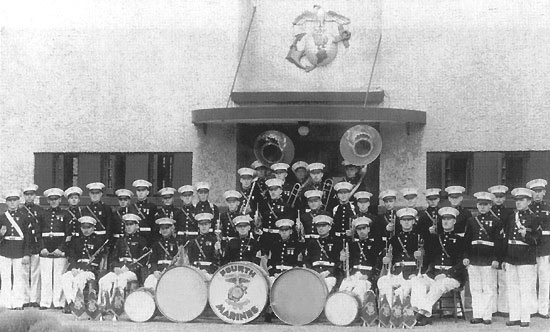 |
||||||||||||||||||
| Fourth
Marines Band Shanghai, China / September, 1940 / 551 Ferry Road Billet |
||||||||||||||||||
|
Cpl. Claude Lester Brent - Clarinet PFC Artie E. Sanville - Clarinet PFC William. E. Harrison - Clarinet FM Sgt. Wm. j. McClung III - NCO in C Bugle & Drum Corps TSgt. Jackson P. Rauhof - Drum Major MFSgt. Levis E. Giffin - Bandmaster Sgt. Frederick L. Mayberry - Percussion / Instrument Repair Cpl. George Francis - Trumpet PFC Sp/4c Steven A. Jones - Trumpet PFC Sp/5c John F. Sirota - Trumpet Pvt. Sp/5c Robert S. Newsome - Trumpet FM Robert E. Follendorf - Bugle / Drums FM Martin D. Eichman - Bugle / Drums PFC Sp/5c Floyd E. Grim - Percussion FM Bernie D. Pitts - Bugle / Drums Pvt. Sp/4c Hal T. Leber - Clarinet FM I/c Frederick Stumpges - Bugle / Drums PFC Sp/5c Leland H. Montgomey - Clarinet FMC CpI. William H. Adams - Bugle / Drums PFC Sp/5c John J. Lawson - Clarinet FM Warren H. Mellies - Bugle / Scotch / Tenor Drums Pvt. Sp/5c Donald L. Versaw - French Horn Pvt. Sp/4c Arnold S. Baker - French Horn PFC Anthony Stankitis - French Horn FM 1/c Harry C. Dunlavy - Bugle / Scotch / Tenor Drums Pvt. Sp/5c George McRae - Trumpet Pvt. Pat Bennet - Trumpet Pvt. Sp/5c Mercurio Coledanchise - Baritone Horn FM Melvin Mikkelson - Bugle / Drums FM 1/c Melvin J. Zhaler - Bugle FM 1/c Rodger D. Baker - Bugle FM. Wesley LeB. Usher - Bugle / Drums PFC Sp/3c Gerald P. “Mickey” Finn - Percussion PFC Sp/5c Donald F. Scott Percussion Pvt. Sp/4c Victor 0. Lundgren Trombone Additional duty as Chaplain’s Assistant / Leader of congregation Singing at Devine Services Pvt. Sp/5c James W. Higley Sousaphone PFC Sp/4c John Snyder Trombone / Library PFC Sp/4c Hubert H. Johnson Baritone Horn PFC Sp/5c Sydney A. McMullen Trombone Pvt. Sp/5c Charles F. King Sousaphone |
||||||||||||||||||
|
|
||||||||||||||||||
| Outdoor Marine Band Concert at the Peking (Beijing)
Legation Summer 1941 |
||||||||||||||||||
 |
||||||||||||||||||
| Fourth
Marines Band Shanghai, China / September, 1941 |
||||||||||||||||||
 |
||||||||||||||||||
| Shanghai, China / 28 November, 1941 | ||||||||||||||||||
|
The Fourth Marines Band leads the troops from the First Battalion down East Nanking Road leaving the International Settlement where Marines had been stationed since 1937. Drum Major, TSgt. Jackson P. Rauhof is seen in front of the band with his mace. At the extreme left MTSgt. Levis E. Giffin, the Bandmaster, marches in a lone column. Others in the front rank are: George Walker, Sousaphone; Sydney McMullen, Monford Charleton; Cedric Stephens playing Trombones. Charles King with Sousaphone is at far right. In the second rank: John Sirota, Trumpet; John Bingham and Donald Versaw (barely visible behind Stephens), French Horns. Third rank: Kenneth Marshall, Clarinet; Pat Bennett, Francis Hooker, Trumpets. This was the last marching event performed by the band as it made its way to the city’s famous waterfront, The Bund, with the troops to board U.S. President Lines ships anchored in the river just off shore. |
||||||||||||||||||
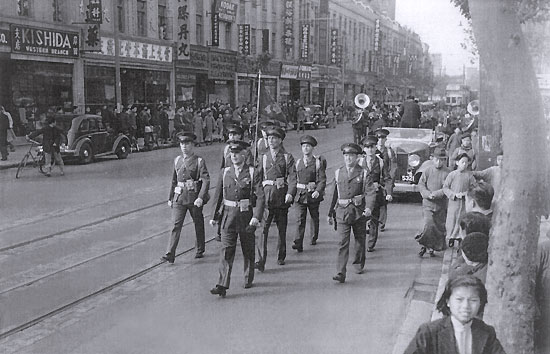 |
||||||||||||||||||
| Shanghai, China / 28 November, 1941 | ||||||||||||||||||
|
The Fourth Marines leave the International Settlement of China’s famed “Paris of the Orient” as relationships with the Japanese Forces surrounding the city are in jeopardy and the threat of war increases. Marines had been there protecting the lives and property for many years. The famous 4th Marines were a part of these forces since 1937. In this view Colonel Samuel Howard and his staff lead the way through down the colorful street called Nanking Road followed by troops of the First Battalion. An open Rolls-Royce in rear of the staff of nine officers and men of Headquarters Fourth Marines has entered the line of march to photograph the band led by Drum Major Jackson P. Rauhof and Master Technical Sergeant Levis E. Giffin, the bandmaster. The Second Battalion had departed the previous day during a rainstorm and waited aboard ships anchored in Shanghai’s river harbor of the Whangpoo. The entire organization then departed in the late afternoon destined for the Philippines. |
||||||||||||||||||
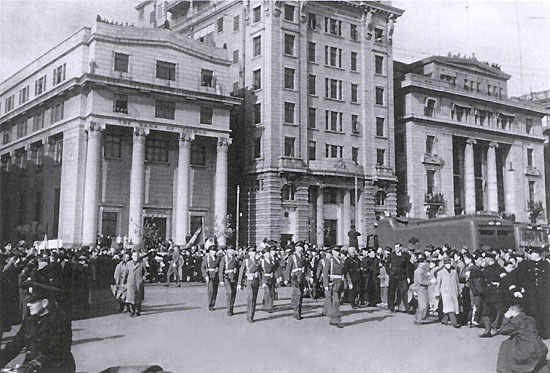 |
||||||||||||||||||
| Shanghai, China / 28 November, 1941 | ||||||||||||||||||
|
The last echelons of Fourth Marines arrive at the world renowned waterfront street called THE BUND. The distinctive Western style bank and office buildings form a classic backdrop for the departure from the headquarters led by Colonel Samuel B. Howard. The Fourth Marines Commander and his staff are shown as they emerge from crowded street canyons of the great city. In the far background at the foot of the Bank of Taiwan, Drum Major Rauhof can be seen executing a “Band, Column Left!” command. To the extreme right a Shanghai Metropolitan Police Mobile Command Post vehicle is on site to help with crowd control. |
||||||||||||||||||
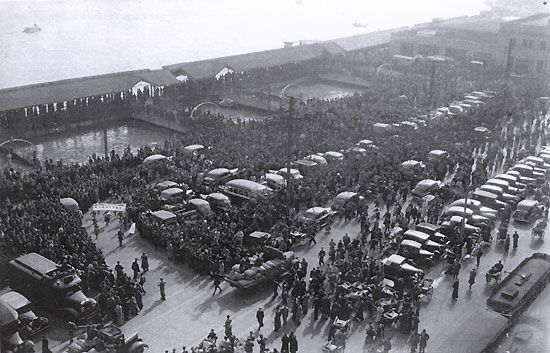 |
||||||||||||||||||
| Shanghai, China / 28 November, 1941 | ||||||||||||||||||
|
Birds eye view of quay(s) on the banks of the Whangpoo River, the port of Shanghai during the farewell of the Fourth Marines as it prepares to leave the International Settlement. Throngs of people are seen gathered among the limousines of the world’s diplomatic, consular force and business firms watching troops of the First Battalion arrive led by the Fourth Marines band (note: Sousaphone base horns just to left of picture center). Plainly seen in the line of march carrying a large banner are elements of Shanghai’s Volunteer Defense Force wearing kilts and playing bag pipes. Shortly after this resounding, amazing and confusing send off, the Marines departed for the Philippines ending their duty in Shanghai after many years. |
||||||||||||||||||
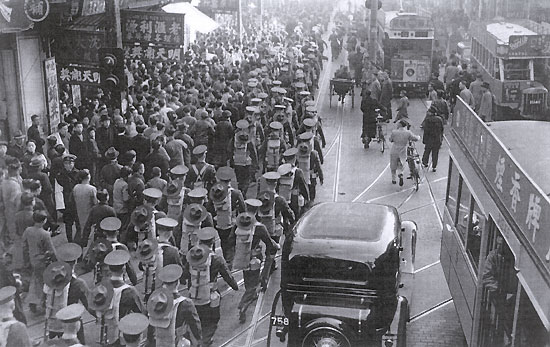 |
||||||||||||||||||
| Shanghai, China / 28 November, 1941 | ||||||||||||||||||
|
Troops of the First Battalion, Fourth Marines march down Nanking Road, on their way to the quays of the Whangpoo River preparatory to embarking on U. S. President Line ships for the Philippine Islands. The Marines share the crowded streets with examples of every mode of transportation available. The troops are carrying “Heavy Marching Order” packs topped with neatly blocked campaign hats, armed with Springfield 1903 rifles at the left shoulder. Beneath each hat is the standard issue foul weather gear called a “pancho” and entrenching tool. At the head of this column pictured, the Fourth Marines Band can be seen breaking out into brighter sunlight. This proved to be a false foreboding as this historic field band would cease to be one in only ten more days. |
||||||||||||||||||
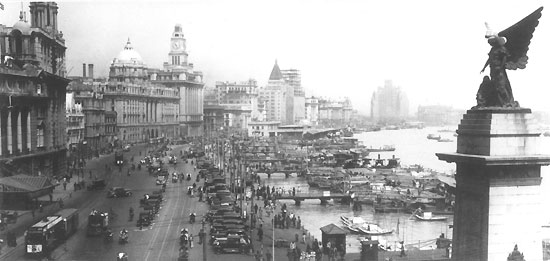 |
||||||||||||||||||
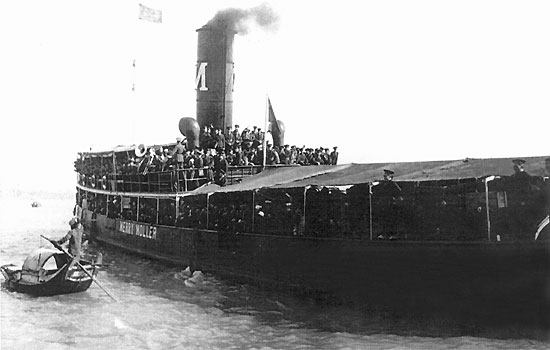 |
||||||||||||||||||
| Shanghai, China / 28 November, 1941 | ||||||||||||||||||
|
A lone Chinese sampan escorts a ship tender, the Merry Moller carrying troops of the Fourth Marines from banks of the Whangpoo River to American President Liner, SS President Harrison, anchored in deeper water. Among the troops were all of the First Battalion and the staff of regimental headquarters. The Fourth Marines Band is easily located on the top deck. |
||||||||||||||||||
| ROSTER
OF THE PEKING LEGATION AND FOURTH MARINES BAND MUSICIANS Peking (Beijing) and Shanghai China / 1940 - 1941 Killed in Action Sim Ashburn Popejoy FM 1 c Claude L. Brent Cpl John W.Bingham Sgt Levis E. Giffin MTSgt William F. Fryer PFC Jesse E. Grenz PFC John F. Sirota PFC Harry B. LaPointe Jr. PFC George E. Walker PFC Died in POW Camps Leon Konesky TSgt Donald Scott PFC Charles F. King PFC The Survivors Jackson P. Rauhof TSgt / Drum-Major Mercurio Coledanchise PFC / Baritone Horn Sherwood LaRoche PFC / Percussion John P. Latham PFC / Piccolo/flute Alfred August PFC / Bass Horn Pat F. Bennet PFC / Trumpet George Francis Cpl / Trumpet George McRae PFC / Trumpet Robert Newsome PFC / Trumpet Francis Hooker Cpl / Trumpet Kenneth Marshall Cpl / Clarinet / Saxophone Leland Montgomery PFC / Clarinet Louis N. Curtis PFC / Clarinet Hal T. Leber PFC / Clarinet Franklin Boyer Cpl / Clarinet Monford P. Charleton PFC / Trombone S. W. Stephens PFC / Trombone Sidney A. McMullen Cpl / Trombone Harry Goldstien PFC / Trombone John W. Brannan PFC / Trombone Donald L. Versaw PFC / French horn Anthony Stankitis PFC / French Horn Norman 0. Shire PFC / French horn William
McClung FMSgt / Bugle/drums Frederick Stumpges FM 1 c / Bugle/drums Martin V. Eichman FMcpl / Bugle/drums Harry C. Dunlavy FMsgt / Bugle/drums William H. Adams FN I c / Bugle/drms John K. Corley FMcpI / Bugle/drms Carl F. Girardot FM I c / Bugle/drums Melvin Mickelson FM 1 c / Bugle/drms Bobby Jones FM I c / Bugle/drms Delmar V. Meyers FM 1 c / Bugle/drums Charles Patterson FMcpl / Bugle/drums Bernino B. Pitts FM 1 c / Bugle/drums Melvin J. Zahier FM I c / Bugle/drums |
||||||||||||||||||
|
||||||||||||||||||
|
DONALD
L. VERSAW, born June 23, 1921 in Bloomington, Nebraska. Joined the U.S.
Marine Corps on Armistice Day, 1939 in Chicago. Following recruit
training and a short term with the Marine Corps Operating Base Band,
San Diego, CA, he was sent to Shanghai, China for duty with the 4th
Marines Band. After the regiment was evacuated to the Philippines and
at the outset of World War II, he became an infantryman in E Co. Second
Battalion, Fourth Regiment. When Corregidor was surrendered to the
Japanese in May 1942, he spent the next 40 months as a POW in the PI’s
and in Japan. |
||||||||||||||||||
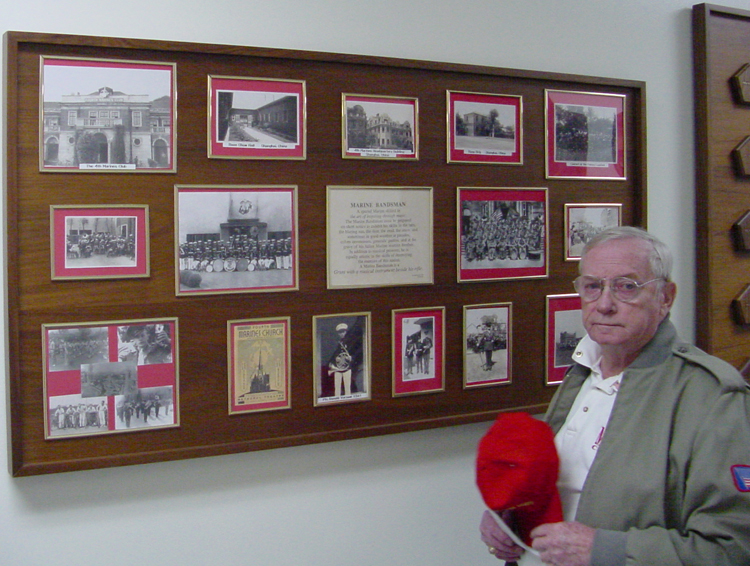 |
||||||||||||||||||
| OTHER
BOOKS AND ARTICLES BY THE AUTHOR The Last China Band Sound of the Bugle The Anvil Chorus |
||||||||||||||||||
| Copyright © 1998 Donald L. Versaw. All rights reserved. No part of this book may be reproduced or transmitted in any form or by any means, electronic, or mechanical, Including photo copy, recording or any information storage and retrieval systems, without permission in writing from the author. Requests for permission to make copies of any part of this work should be directed to lastchinaband.com contact page. | ||||||||||||||||||
| Full Text of MIKADO NO KYAKU (Guest of the Emperor) | Please Click Below for: |
| 1. Introduction to Slavery | Page 1 |
| 2. Our New Home in Bongabon | Page 15 |
| 3. To the Shade of Mount Penatubo | Page 37 |
| 4. Bilibid Prison Again | Page 55 |
| 5. Cabanatuan "Revisited" 1944 | Page 59 |
| 6. The Nissyo Maru. A True Trip of Terror | Page 67 |
| 7. Where the Birds Don't Sing and Flowers Don't Smell | Page 82 |
| 8. The Setting of the Rising Sun | Page 99 |
| Epilogue | Page 117 |
|
|
| Please Click Below To Return To: |
| EMAIL: info@4thmarinesband.com |
| ©2000-2021 lastchinaband.com. All rights reserved. |